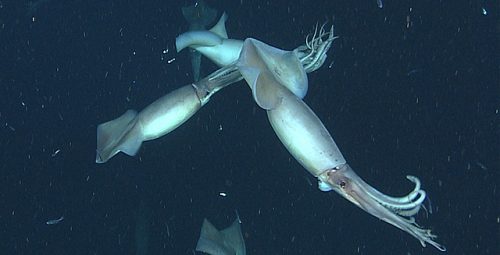I’m not good at parties. Get a whole bunch of people chattering away at once, and I’m overwhelmed and retreat into the woodwork. But here’s a group of Humboldt squid having an animated conversation.

Instead of producing an auditory cacophony, they instead signal to each other with color patterns. This makes a lot of sense to me.

Next time I attend a party (who am I kidding? No one is ever going to have a party again, and live), I should wire myself up with colored LEDs, with a little control panel in my hand so I can change the pattern depending on my mood.
“But, PZ,” you are about to say, “nobody else would understand your signals.” Exactly. That would be perfect. After all, we don’t understand what the squid are saying, either.


I’m not sure we really understand what other people are saying, either.
(That might be because most people don’t really listen to what anyone else is telling them, they just assume that they’re saying what they want to believe they’re saying. Maybe we’re all just talking to some sort of Eliza program in our heads.)
((There’s also the philosophical question of whether, when we do listen, we’re really understanding what the other person has in mind. E.g., when they say, “I see an orange ball,” are they talking about what we would mean if we said, “I see an orange ball”?))
24 luxemes; about the same as the number of phonemes in Japanese. Capable of expressing any (expressible (note- are there any others?)) human thought, so I wonder how rich a mental world |Humboldt squid have…
Perhaps squid are like Daniel Tamett who sees numbers as shapes and colors. One pattern/color combination could mean there’s a a big seal nearby. Another could mean a fishing boat is coming. A third could mean there are many shrimp over there.
In Arthur C. Clarke’s novel The Deep Range, giant squid communicate by coloured / colorisation signalling, albeit my memory now is he had them glowing. (Or was it the whales who communicated like that? That novel is old (late-1950s) and I read it only once, some decades before the start of this millennium, so my memory is rather faint on the details.) The novel is set in a world where whales are ranched for human food, supplying a significant portion of the world’s protein.
I’m a bit conflicted- for a start, I should have called them lucemes. But maybe photemes? In any case, the data rate is important too. How quickly do they change? The order of 4-6 a second is probably the human phoneme rate, but there’s also a hell of a lot of redundancy. But back to the question: are Humboldt squid as slick as a parrot?
This is amazing !!!! Humans signal each other with sound waves and body movements. Plants signal each other and animals with pheromones and colors . And these squid use color and body movements. If we ever understand these different mode of communication we might be able to communicate with aliens 👽 if they ever exist.
@4 blf
The Children of Time and Children of Ruin books by Adrian Tchaikovsky are excellent. First one is about intelligence being inadvertently modified into spider genes. Second the same, but with octopi, and communication across species is the major problem. Sound vs patterns and colors.
Project Hail Mary by Andy Weir uses the same theme of communication between species of major sensory differences.
blf@4 I literally thought I was the only person alive who had read The Deep Range. Next you’re going to tell me you read The Green Brain by Frank Herbert. There was a time when my reading was heavily influenced by what was available in used bookstores, specifically the works by famous authors that people didn’t hold onto and nobody bought.
Glide Path is another obscure one by Arthur C. Clarke, in this case, not even science fiction, just a novel about his WWII experience working on radar.
Wikipedia says 2-4Hz, so not far from human data rate. Squid speak Japanese with a Zummerzet drawl. Now, if our alien uses infra red or UV for communication, we couldn’t see it, and maybe we’d assume they use telepathy…
dorght@7, Thanks for the recommendations, none of those are familiar to me.
PaulBC@8, Ha! My memory is I borrowed The Deep Range from the library, and yeah, I’ve never met anyone else who has even heard of it. On the other hand, I don’t go around waving tentacles and flashing colours asking “Have you ever read The Deep Range?”
I don’t think I’ve ever head of Green Brain. I have heard of Glide Path, but I’m not sure the one I very vaguely recall hearing about is Clarke’s, albeit who / what else is (now) a mystery. In any case, I’m fairly confident I haven’t read it.
Two (both rather brilliant, actually) series I recall discovering in used-book stores are Glen Cook’s Garrett, P.I., and Randall Garrett’s Lord Darcy.
blf@10 I think it’s safe to say it would be impossible to write a novel about whale farming today, except maybe as a dystopian satire. I recall Clarke ends the novel with an international decision to ban the sale of whale meat. (Wasn’t he personally vegetarian?) I’m not sure if the “whale boys” continue their operations for scientific discovery. It was a really long time ago that I read it (the 80s) and even then it was kind of a WTF “yesterday’s future” novel. That doesn’t make it bad. I can’t think of another science fiction novel even remotely like it. The only problem is not really having anyone to talk to about it.
The Green Brain is essentially a “nature takes revenge” scenario and I didn’t find it very interesting. I read it pretty fast and parts were confusing. Insects had formed a collective mind… or it was more than just insects. I think “green” in the symbolic sense of environmental, and not literally the color. Frank Herbert fans (or I should say Dune fans) that I’ve asked don’t like it.
Glide Path may be worth picking up, not for any literary value, but as a workmanlike account of how Clarke spent WWII. It’s a very chummy novel about male engineers trying to spot German bombers over Britain. The attempts at humor are a a little cringy (in my recollection) but if you’re a Clarke fan (which I was at one time) it’s another piece of the puzzle.
Continuing OT me@11 Here’s a real find (at least for me). A 1959 conversation between Arthur C. Clarke and Studs Terkel! They discuss The Deep Range among other things and Clarke claims to be a “spiritual vegetarian”, but I still think he may have literally become a vegetarian later on.
Also, shortly after posting the phrase “a very chummy novel” I realized the same might be said of The Deep Range, though in a different sense of the word. (OK I’ll stop now.)
Paulbc @ 8
Ha! Of course I have read The Deep Range (and a story of the same theme by the Strugatskys)!
But you have to go to Stanislaw Lem for the depressing “failure of communication” stuff.
We do not really know what cephalopods signal to one another. Kris Kelvin does not understand the attempted communication from the sapient entity that is Solaris. The post-SETI astronomers of His Master’s Voice only untangle a small fraction of the signal from the stars.
It would be nice to untangle squid communication but we cannot take the possibility for granted.
birgerjohansson@13, “a story of the same theme [whale ranching] by the Strugatskys”.
Deep Search, perhaps? Has that ever been translated into English?
Your mention of the Strugatsky brothers triggered a vague old memory; Generalissimo Google™ did the rest.
This thread is turning-into an OT-ish “name the most obscure SF story / novel you can (as long as it involves whales or squids, and (mis-)communication)”… I seem to have started it (@4), but am not too sure there’s any reason to apologise?
blf@14
Maybe not. I will add +1 for Solaris though it’s not obscure. I remember being struck by his idea of classifying phenomena, including those that don’t fit any pattern (I forget how Lem described this). For me, this would be the holy grail of a self-organizing computer simulation, namely that it just keeps surprising you. Most run out of surprises pretty soon after an initial burst of self-organizing behavior, or the surprises might just take a long time to appear.
Most of the Lem I have read (in English translation obviously) just seems clever but doesn’t grip me emotionally. By contrast, Solaris felt both interesting philosophically and poignant from a human perspective. I need to reread it.
Love all the Arthur C. Clarke discussion – he was my favorite writer growing up. Childhood’s End is a book that didn’t mean much to me when I was a kid, but has gotten more and more meaningful the older I get.
@PaulBC – Clarke and Studs Terkel – wow! That’s a pairing I never would have guessed at!
Here is a tour of Clarke’s Sri Lanka home – also moving: https://www.choosingeasy.com/a-visit-to-arthur-c-clarkes-home-in-colombo-sri-lanka/
hillaryrettig1@16 Yup. I think Studs Terkel made it his business to talk to everyone. I really should dig and see what else I can find.
blf@ 14
No need to apologize, the old stuff have a lot of interesting ideas. 😊
Hillaryrettig1, Paulbc, I wrote to ACC with some questions and he replied, although he must have had tons of correspondence with publishers (and requests for writing forewords). Over the years there was quite a bit of back-and-forth, I hope I can find those letters again. A very nice guy.
Fun fact; when a US journal published an article about carbon nanotubes and tensile strength I hurried to mail a copy to him- it looked as space elevators had become possible!
(today we know carbon nanotubes are not necessarily feasible, as the bulk tensile strength is magnitudes lower 😔 )
Also, Valerie Ekanayake of ACCs household is very nice. I recall that after ACCs last pet died after a short life he was so heartbroken he did not get more pets.
birgerjohansson@18 Arthur C. Clarke was my favorite science fiction author for a long time. I got more into Philip K. Dick later on, for somewhat different reasons. It never would have occurred to me to write to him. My loss!
Clarke’s interview with Terkel kind of hammered home to me how much of my views on religion and spirituality are influenced by him as well as Carl Sagan. First off, I think it’s cool that Clarke could forthrightly discuss what he called his “agnosticism” on US radio in 1959, though I’m sure it aligned reasonably well with Terkel. But I especially like his idea that if we’re ever going to have “faith” that we had first better spend a thousand or more years learning about the reality we can observe around us. We barely know anything yet, just a little about this one speck where we live. The default position should be one of humility. It’s the Bible thumpers who are ignorantly confident. (His comment about the “Freudian revolution” seemed dated, though I have heard people defend Freud as groundbreaking in his approach even if his conclusions are nonsense.)
PaulBC @ 20
Philip K. Dick was “problematic” as a person but his writing makes him stand head and shoulders above most contemporary SF authors.
.
The Humboldt squid would also be at an advantage in an environment where predators depend on sound to locate prey.